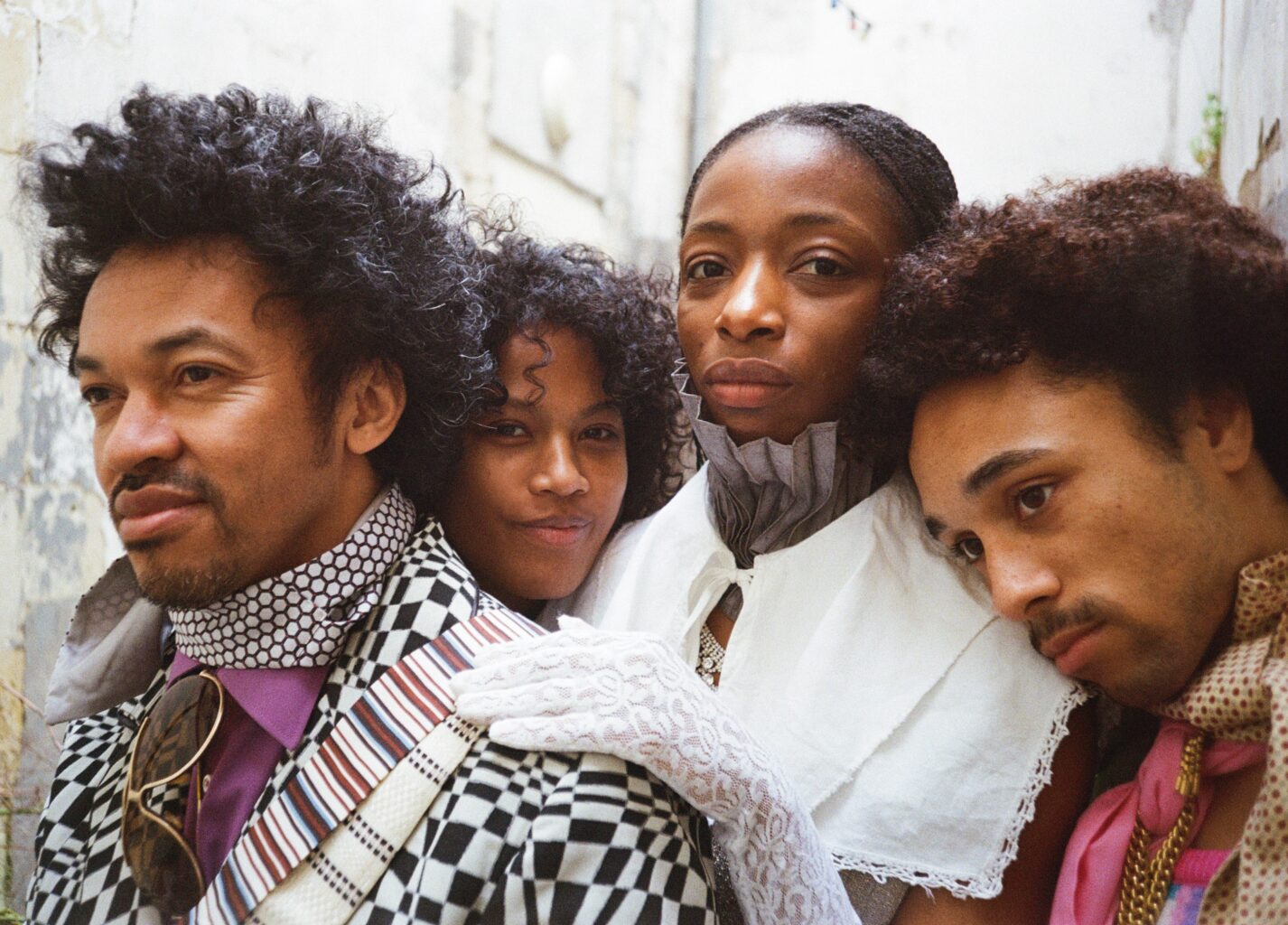
What inspired you to embark on this joyous journey alongside musician Joël Rabesolo and dancers Audrey Merlius and Stanley Ollivier?
What inspired me was the absence of stories and living conversations about how colonization has profoundly impacted the children of the diasporas: their connection to their countries of origin, their languages, their bodies, and their cultures. In Europe, colonization is often hidden away in discreet, embarrassing cupboards, as if hoping to be forgotten.
With Joël, Audrey, and Stanley, we each carry distinct stories, but we all come from islands intricately linked to France through colonization. Joël and I began by improvising together and discovered a strong artistic connection. He grew up in Madagascar, I didn’t, so our dialogue is layered and rich.
Audrey, who is from the Haitian diaspora, and Stanley, from Guadeloupe and Martinique (which are still French territories) bring other perspectives. We also connect through our shared experience of having academic, western-trained dance bodies, while also being rooted in another region, another history.
The question we ask together is: what to do with all of this?
Fampitaha, fampita, fampitàna, three Malagasy words that mean comparison, transmission, and rivalry. Why did you choose this title for your performance?
While I was in Madagascar recording Red Crater, the first part of a diptych completed by the stage performance Fampitaha, fampita, fampitàna, the historian Helihanta Rajaonarison helped me pronounce the word fampitaha correctly. I had been mispronouncing it as fampita, meaning “transmission.” The next day, she messaged me: “There’s also fampitàna, which means ‘rivalry.’” I laughed, fampitaha, fampita, fampitàna, the three words together sounded smooth, a perfect title.
Beyond the meaning comparison, fampitaha is also the name of a 19th-century dance tradition where dancers from across Madagascar competed before the royal family. There’s no monarch today, but these dance encounters continue.
The three words reflect not only a process of linguistic learning, but also the necessity of transmission in reclaiming a language, and the inevitability of rivalry between dominant cultures and cultures of the Third World.
As part of the Madagascan diaspora in Brussels, your piece serves as a dialogue between the children of diasporas and their places of origin. Could you speak more about this?
Yes, this piece is very much about how our places of origin continue to live in our bodies, consciously or not. As children of the diaspora, we often carry fragmented stories, partial languages, and silences. But those fragments move in us, in gestures, in rhythms, in cravings and contradictions.
In Fampitaha, fampita, fampitàna, we’re also confronting how colonial legacies shaped those bodies, the tension between what was erased and what remains. This work is a way to reclaim space, not by returning to some imagined and fantasized origin, but by acknowledging and honouring the complex, ongoing dialogue between where we come from and where we are now. It’s about creating room to exist “in between,” fully and unapologetically.
Soa Ratsifandrihana: Fampitaha, fampita, fampitàna
Stoa 15.11.2025 20.00 / 16.11.2025 17.00
Soup Talk 16.11.2025 11.00 @Eskus
Artistic direction: Soa Ratsifandrihana
Choreography and interpretation: Audrey Merilus, Stanley Ollivier, Soa Ratsifandrihana
Footwork phrase: Raza
Original music and interpretation: Joël Rabesolo
Dramaturgy: Lily Brieu Nguyen
Artistic collaboration: Jérémie Polin Razanaparany aka Raza, Amelia Ewu,
Thi Mai Nguyen
Light design: Marie-Christine Soma
Costumes: Harilay Rabenjamina
Costume assistance: l’Atelier Costumes du Théâtre Varia – Fabienne Damiean, Baptiste Alexandre, Marie-Céline Debande
Sound design: Chloé Despax, Guilhem Angot
Insight on questions of transmission and identity: Prisca Ratovonasy
Texts: Sékou Sémega
Outside eye: Maria Dogahe
Tour manager: Thomas Roulleau-Gallais
Lighting manager: Diane Guérin, Julien Rauche (alternating)
Sound manager: Guilhem Angot, Paul Boulier, Jean-Louis Walfart (alternating)
Development, distribution, production: ama brussels – Babacar Ba, Clara Schmitt, Emi Parot, France Morin
Delegated production: ama brussels, Théâtre Varia
In collaboration with: Météores
Co-production: Kaaitheater, Kunstenfestivaldesarts, Théâtre Varia, Charleroi danse, MC93 — Maison de la Culture de Seine-Saint-Denis, ICI – Centre Chorégraphique National Montpellier Occitanie / Direction Christian Rizzo, Centre Chorégraphique National d’Orléans-direction Maud Le Pladec, Le Gymnase-CDCN Roubaix, La Place de la Danse-CDCN Toulouse / Occitanie, Fonds Yavarhoussen, Tanz im August / HAU Hebbel am Ufer, Fonds Transfabrik – fonds franco-allemand pour le spectacle vivant, La Coop asbl, Shelter Prod., A-CDCN (Les Hivernales – CDCN d’Avignon, La Manufacture – CDCN Nouvelle-Aquitaine Bordeaux · La Rochelle, L’échangeur – CDCN Hauts-de-France, Le Dancing CDCN Dijon Bourgogne-Franche-Comté, Chorège CDCN Falaise Normandie, Le Pacifique – CDCN Grenoble – Auvergne – Rhône- Alpes, Touka Danses – CDCN Guyane, Atelier de Paris / CDCN, Le Gymnase CDCN Roubaix – Hauts- de-France, POLE-SUD CDCN / Strasbourg, La Place de la Danse – CDCN Toulouse / Occitanie, La Maison Danse CDCN Uzès Gard Occitanie, La briqueterie CDCN du Val-de-Marne).
Residencies: ICI – CCN Montpellier Occitanie, La Bellone – Maison du Spectacle, Gemeenschapscentrum De Kriekelaar, Université d’Antananarivo, KAAP, Le Gymnase-CDCN Roubaix, Théâtre Varia, CCN d’Orléans, Radio Grenouille.
With the support of: Dance Reflections by Van Cleef & Arpels and Fédération Wallonie-Bruxelles – Direction de la danse, Wallonie-Bruxelles International, taxshelter.be, ING et tax shelter du gouvernement fédéral belge.
Thanks to: Julie Iarisoa, Makwa Joma, Arikaomisa Randria, Naivo, Maria Dogahe, Jonathan, Do sy Bodo, Rado
Fampitaha, fampita, fampitàna premiered at Kunstenfestivaldesarts Brussels in May 2024.
Photo: Harilay Rabenjamina
Visit in collaboration: Stoa
Visit supported by: The Government of Flanders, WBI Wallonie Bruxelles international, Finnish Cultural Institute for the Benelux



